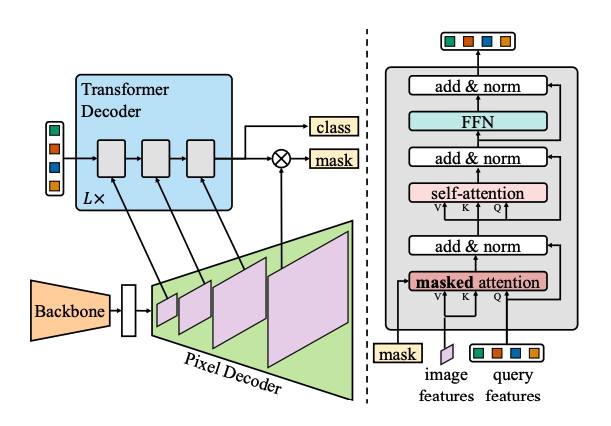
 英文
英文Mask2Former
Mask2Former模型是在Cityscapes实例分割(大尺寸版本,Swin骨干网络)上训练的。该模型在 Masked-attention Mask Transformer for Universal Image Segmentation 论文中介绍,并于 this repository 首次发布。
免责声明:发布Mask2Former模型的团队未为该模型编写模型卡片,因此该模型卡片由Hugging Face团队编写。
模型描述
Mask2Former使用相同的方法处理实例、语义和全景分割:通过预测一组掩码和相应的标签。因此,所有三个任务都被视为实例分割。Mask2Former通过以下方式优于之前的最新方法 MaskFormer ,在性能和效率方面均有提升:(i)使用更高级的多尺度可变形注意力Transformer替换像素解码器,(ii)采用具有掩码注意力的Transformer解码器以提升性能而不引入额外计算,(iii)通过在子采样点上计算损失而不是整个掩码提高训练效率。

预期用途与限制
您可以使用此特定检查点进行实例分割。查看 model hub 以查找您感兴趣的其他任务的微调版本。
使用方法
以下是如何使用该模型的方法:
import requests
import torch
from PIL import Image
from transformers import AutoImageProcessor, Mask2FormerForUniversalSegmentation
# load Mask2Former fine-tuned on Cityscapes instance segmentation
processor = AutoImageProcessor.from_pretrained("facebook/mask2former-swin-large-cityscapes-instance")
model = Mask2FormerForUniversalSegmentation.from_pretrained("facebook/mask2former-swin-large-cityscapes-instance")
url = "http://images.cocodataset.org/val2017/000000039769.jpg"
image = Image.open(requests.get(url, stream=True).raw)
inputs = processor(images=image, return_tensors="pt")
with torch.no_grad():
outputs = model(**inputs)
# model predicts class_queries_logits of shape `(batch_size, num_queries)`
# and masks_queries_logits of shape `(batch_size, num_queries, height, width)`
class_queries_logits = outputs.class_queries_logits
masks_queries_logits = outputs.masks_queries_logits
# you can pass them to processor for postprocessing
result = processor.post_process_instance_segmentation(outputs, target_sizes=[image.size[::-1]])[0]
# we refer to the demo notebooks for visualization (see "Resources" section in the Mask2Former docs)
predicted_instance_map = result["segmentation"]
有关更多代码示例,请参阅 documentation 。





















